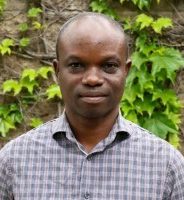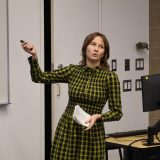
Graduate Research: Ojeikere Vincent Akhadelor on The Impact of Refugee Resettlement Programs on Local Communities in America
November 6, 2024

Ojeikere Vincent Akhadelor
Ojeikere Vincent Akhadelor (He/Him)
’24 (MA International Studies)
Linkedin
Originally from Ogute, Benin City, Nigeria, Ojeikere holds an MA in International Studies with a focus on Climate Change, Migration, and Political Communication. His research explores the impact of refugee resettlement programs on local communities, examining themes of socio-economic integration, cultural diversity, and policy development. With a strong foundation in policy analysis and community development, Ojeikere is committed to contributing to impactful social change.
For our latest Graduate Research feature, Akhadelor discusses the research work that led to and informed his thesis.
Voice of Wilkinson: Tell us what drove your initial interest in developing the research that would eventually lead to your thesis research?
Ojeikere Vincent Akhadelor: My interest in this topic stemmed from my desire to understand the multifaceted effects of migration on local communities. Witnessing the current global refugee crisis sparked my commitment to examine how resettlement programs shape both refugees and host communities, hoping to contribute to inform policy and practice to enhance the integration and well-being of both refugees and host communities.
VoW: What were some key takeaways from your research?
OVA: My research highlights the dual impact of refugee resettlement on host communities revealing both economic revitalization and the challenges of resource allocation. Even though refugee communities contribute immensely to economic growth by filling essential jobs, starting businesses, stimulating the local market and supporting community growth. Their influx can also place a significant burden on public resources such as healthcare, education and housing particularly for cities already facing financial constraints.
The findings highlight that successful integration depends heavily on access to robust support services, such as language training, vocational programs, and mental health resources, and these are critical for helping refugees transition into self-sufficiency and foster their contributions to the local economy.
Nonetheless, local attitudes play a substantial role in successful integration; communities with more open and accepting attitudes toward diversity tend to see smoother integration processes and more positive long-term outcomes. My research suggests that policy frameworks need to consider these factors in order to create a conducive environment where both refugees and host communities thrive.
VoW: What most surprised you about your research or the thesis writing process?
OVA: I was surprised by how the complex socio-political perceptions towards refugees go far beyond surface-level opinions. I discovered that local attitudes are deeply influenced by political rhetoric not just in shaping social dynamics but how it affects actual policy implementation and resettlement outcomes. I find out that even when official policies are supportive, negative public sentiment can lead to resistance, hindering effective integration and limiting access to necessary resources for refugees.
My findings also revealed how historical and cultural factors affect these perceptions. In some cases, past economic downturns or political shifts have left lasting impressions on communities, leading to ingrained skepticism towards newcomers. This complexity added layers to my research, showing that resettlement success relies not only on the services provided but on proactive efforts to foster inclusive mindsets within communities.
VoW: What has been your best experience at Chapman?
Working closely with faculty on research projects has been very rewarding. Their expertise and mentorship have greatly shaped my understanding and approach to global policy issues.
VoW: What are your plans for after graduation?
My goal is to contribute to Nigeria’s development by leveraging expertise gained abroad. I aim to work in an international organization focused on migration and human rights or pursue a PhD to deepen my understanding of the intersection of communication and political science. This path will equip me to address pressing issues in Nigeria and beyond, such as policy reform, migration management, and human rights protections, ultimately fostering positive change.
VoW: For our incoming students to the International Studies program, what did you wish you had known starting your MA? What did you appreciate about the program? Is there a takeaway that still serves you in your day-to-day endeavors?
I wish I had known the importance of networking at the beginning of my study. The program’s flexibility to focus on various global issues has been very rewarding, and I appreciate the ability to apply my studies in the real-time, which continues to guide both my academic and professional pursuits.

